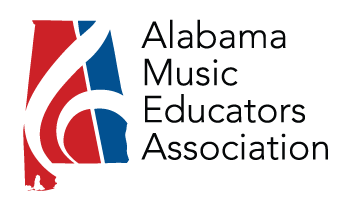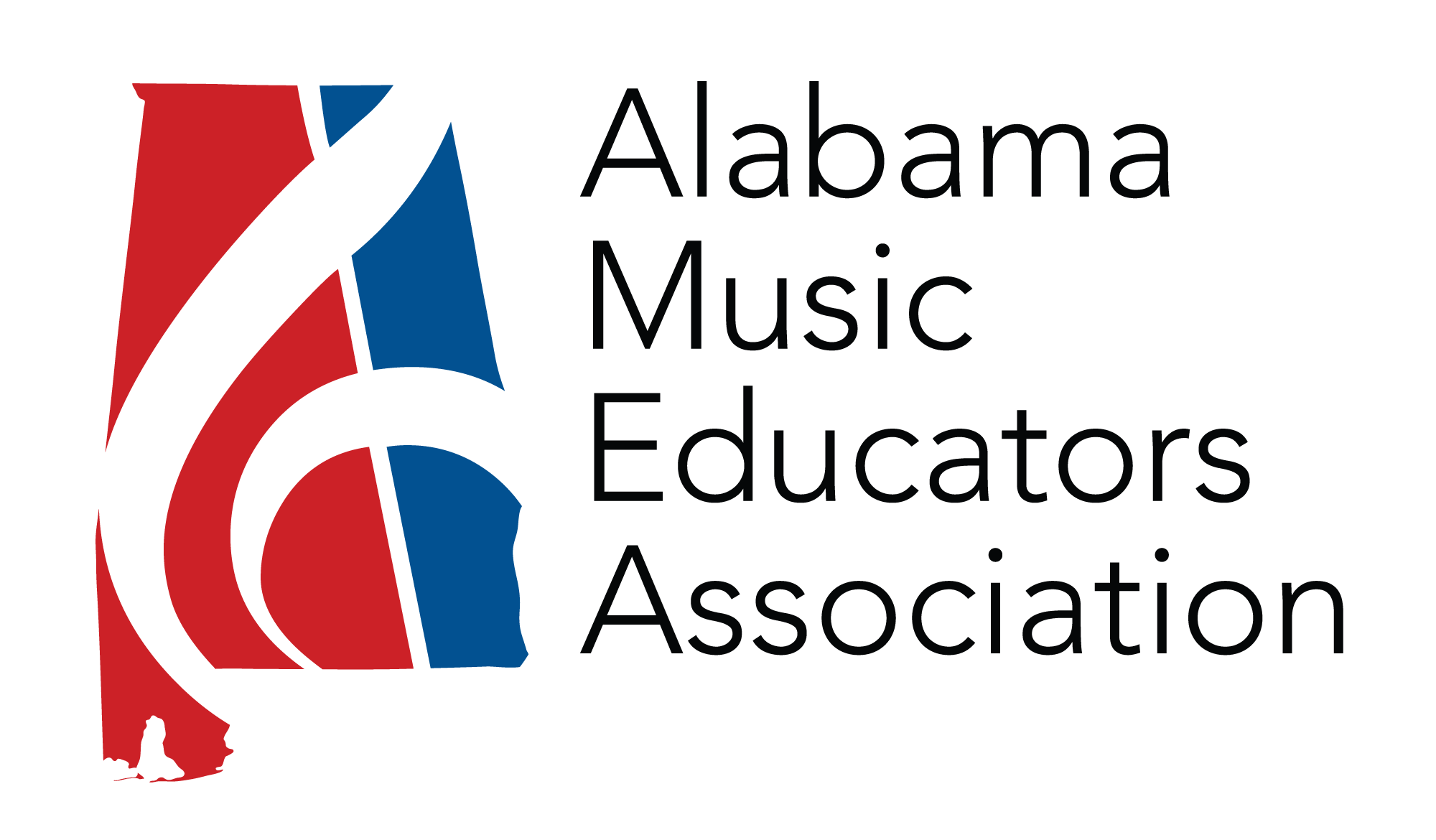#AMEA2022 Conference Exhibitor Info!
THE 2020 ELECTION IS ON! Vote for AMEA President-elect & AMEA Recording Secretary! March 1 – April 1
2024 AMEA Election Candidtates
As we gear up for the upcoming AMEA elections, it’s crucial to learn about the candidates nominated for the roles of President-elect and Recording Secretary. These positions play a significant role in guiding our organization’s path and ensuring the continued excellence of music education in Alabama. We invite our members to explore the candidate profiles to make informed decisions for our association’s bright future.
AMEA President-Elect Candidates
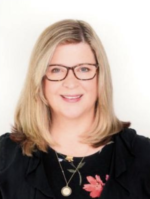 Dr. Becky Halliday is a professor of music at the University of Montevallo, where she teaches courses in music education with a specialty in general music. In addition, to her teaching responsibilities, she is the founding Director of the University of Montevallo Kodaly Institute (UMKI), a teacher training course that is in endorsed by the organization of American Kodaly, Educators (OAKE), and a co-Director of the University of Montevallo Young Musicians Camp. Prior to her appointment at UM, she taught elementary general music in Georgia and Mississippi for 17 years. Dr. Halliday is currently in her sixth year as a volunteer in Bibb County, teaching Pre-K – 6th grade elementary general music at Randolph Elementary School, giving her undergraduate music education majors the opportunity to observe and teach under her direct supervision. She has been the recipient of a notable award, including the distinguished teacher award for the university of Montevallo College of Fine Arts and the Lacey Powell Outstanding Music Educators Award for the Alabama Music Educators Association.
Dr. Becky Halliday is a professor of music at the University of Montevallo, where she teaches courses in music education with a specialty in general music. In addition, to her teaching responsibilities, she is the founding Director of the University of Montevallo Kodaly Institute (UMKI), a teacher training course that is in endorsed by the organization of American Kodaly, Educators (OAKE), and a co-Director of the University of Montevallo Young Musicians Camp. Prior to her appointment at UM, she taught elementary general music in Georgia and Mississippi for 17 years. Dr. Halliday is currently in her sixth year as a volunteer in Bibb County, teaching Pre-K – 6th grade elementary general music at Randolph Elementary School, giving her undergraduate music education majors the opportunity to observe and teach under her direct supervision. She has been the recipient of a notable award, including the distinguished teacher award for the university of Montevallo College of Fine Arts and the Lacey Powell Outstanding Music Educators Award for the Alabama Music Educators Association.
As a clinician, Dr. Halliday has led elementary music workshops related to curriculum and instruction framed in both the Kodaly concept and the Orff Schulwerk approach, arts integration, and basic conducting. Her presentations have been featured in state and national conferences, including the upcoming OAKE national conference in March 2024. She has also served as a conductor of children’s choir in Alabama, Florida, and Georgia, including the AMEA Elementary Honor Choir. As a scholar, she has publications in state and national journals, and has presented at conferences across the country, including the NAfME Research Symposium, the Mountain Lake Colloquium, and the American Educational Research Association Conference. Her work on the committee to revise the 2006 Alabama Course of Studies for fine arts has since let her to conduct presentations across the state to assist teachers in understanding and applying the 2017 state standards. Her current research initiatives include a comparison of song repertoire found in and across multiple general music textbook series from the 20th century to the present, as well as researching an analyzing children’s folk songs and singing games that originated in Alabama. In addition, she has served in leadership positions with the Sweet Home Alabama Kodaly Educators (SHAKE) chapter of OAKE and the Higher Education Division of AMEA. Currently, she serves as Southern Division Representative for NAfME’S’s council of General Music Education. She earned her PhD in music education from the University of Southern Mississippi, and both her MMEd and BMUS from the University of Georgia. She hold certifications in both the Orff-Schulwerk Approach through the University of Kentucky and the Kodaly Concepts through the University of Montevallo Kodaly Institute.
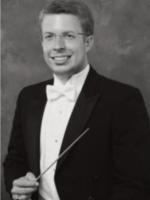 Dr. Travis Bender is the fine arts department chair and associate Director of bands at Oak Mountain High School. He currently serves as the ABA district for chairman. In 2019, Dr. Bender was named the Oak Mountains “Teacher of the Year. ” Prior to joining the OMHS faculty, he served as Director of Bands at Liberty Park Middle School, where he was named “Teacher of the Year” in 2011. His duties at OMHS include teaching the symphonic band, jazz band, marching band, chamber music, and band techniques. Dr. Bender has written the marching band drill and co-arrange the music for Oak Mountains “Spirit of Cahaba” Marching Band since 2014.
Dr. Travis Bender is the fine arts department chair and associate Director of bands at Oak Mountain High School. He currently serves as the ABA district for chairman. In 2019, Dr. Bender was named the Oak Mountains “Teacher of the Year. ” Prior to joining the OMHS faculty, he served as Director of Bands at Liberty Park Middle School, where he was named “Teacher of the Year” in 2011. His duties at OMHS include teaching the symphonic band, jazz band, marching band, chamber music, and band techniques. Dr. Bender has written the marching band drill and co-arrange the music for Oak Mountains “Spirit of Cahaba” Marching Band since 2014.
Dr. Bender is a graduate of the University of Alabama, where he received his bachelor’s and master’s degree in music education. While attending UA, he served as a drum major of the “Million Dollar Band” and as conductor of the Tuscaloosa Winds, a community band for the western Alabama region. In addition to his conducting capacities, Dr. Bender also performed extensively as the pianist for the Alabama Wind Ensemble for six years and as a trombonist for the symphonic band and various pep bands. His professional affiliations include NAfME, ABA, NBA, and the music honorary, Phi Kappa Lambda. Under his leadership, Dr. Bender’s bands have consistently received superior ratings at contests and festivals. His bands were invited to perform at the Alabama Music Educators Association Conference in 2012 and 2019. He has also conducted ensembles at the CBDNA Southern Conference (2014), Carnegie Hall (2015), and the Music for All National Band Festival (2016). Dr. Bender’s bands have received first place awards at the Dixie Classic Grand National Adjudicators Festival (2013), the Smoky Mountain Music Festival (2019), and Festival Disney (2012 and 2017). He has coordinated the Oak Mountain “Spirit of Cahaba” Marching Band performances in the National Cherry Blossom Parade (2018) as well as parades at Walt Disney World’s Epcot (2017) and Magic Kingdom (2020). Dr. Bender has presented sessions at the 2014 and 2016 AMEA Conference, the 2018 MSERA Conference, and the 2021 ABA Summer Conference. In addition to music instruction, Dr. Bender has a strong interest in student and teacher leadership as well as music advocacy. He holds a second Masters degree, an Educational Specialist degree, and a doctorate of education in Educational Leadership from Samford University. Beyond teaching, Dr. Bender is actively involved as an elder at Crossbridge Church and love serving as the VBS worship leader each year. He currently resides in Birmingham, Alabama with his wife, Krista, a fifth grade teacher at Oak Mountain intermediate school. They have one daughter, Madison, and one son, Matthew.
AMEA Recording Secretary Candidates

Heather Holmes serves as Director of Bands at Oak Mountain Middle School in Birmingham, AL. The OMMS Band program is the largest band program in Shelby County and has approximately 330 students. The bands consistently perform at a high level and receive regular superior ratings. During the school day, Mrs. Holmes teaches three Beginner Band classes, Concert Band, Symphonic Band, and Advanced Band.
Mrs. Holmes received her Bachelor of Science in Music Education from the University of Alabama. She achieved National Board Certification in Early and Middle Childhood Music in December 2022. Mrs. Holmes is currently pursuing a Master’s Degree in Instructional Leadership at the University of Montevallo. Prior to her appointment at Oak Mountain Middle School, she served as the band director at her alma mater, Brooks High School, for five years.
Outside of the classroom, Mrs. Holmes serves as Recording Secretary for the Alabama Music Educators Association and Secretary for the Shelby County Band Directors Association. She is a member of the OMMS School Leadership Team and was named Oak Mountain Middle School’s Teacher of the Year in 2016. Mrs. Holmes is active as a guest clinician and conductor for middle school bands throughout the region.
Her professional affiliations include the National Association for Music Education, American School Band Directors Association, Alabama Music Educators Association, Alabama Bandmasters Association, and Sigma Alpha Iota.
In addition to teaching, Mrs. Holmes sings with the First Baptist Pelham Church Choir and helps direct the Children’s Choir. She resides in Birmingham with her husband, Jason, and their two children, Ella and William.
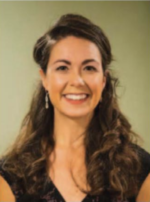 Dr. Morgan Soja is the Director of Music Education at Samford University. She earned her PhD and MM in Music Education from the University of North Carolina at Greensboro, and her BM in Music Education from Bowling Green State University. She has certificates in Kodaly levels I and II, Orff Level I, II, and III, and GIML introductions to MLT and Elementary General Music Coursework. Soja has participated in initiatives with the Supporting Beginning Music Teachers area of strategic planning and action of SMTE. She has presented frequently at state and national NAfME conferences, and at workshops throughout Alabama and North Carolina.
Dr. Morgan Soja is the Director of Music Education at Samford University. She earned her PhD and MM in Music Education from the University of North Carolina at Greensboro, and her BM in Music Education from Bowling Green State University. She has certificates in Kodaly levels I and II, Orff Level I, II, and III, and GIML introductions to MLT and Elementary General Music Coursework. Soja has participated in initiatives with the Supporting Beginning Music Teachers area of strategic planning and action of SMTE. She has presented frequently at state and national NAfME conferences, and at workshops throughout Alabama and North Carolina.
AMEA General Elections and Bylaw Change
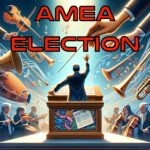 AMEA will hold General Elections for President-Elect and Recording Secretary from April 1 – May 1, 2024. Candidates for President-Elect are Dr. Becky Halliday and Dr. Travis Bender. Recording Secretary Canidates are Heather Holmes and Dr. Morgan Soja. Candidate Bios can be found by CLICKING HERE
AMEA will hold General Elections for President-Elect and Recording Secretary from April 1 – May 1, 2024. Candidates for President-Elect are Dr. Becky Halliday and Dr. Travis Bender. Recording Secretary Canidates are Heather Holmes and Dr. Morgan Soja. Candidate Bios can be found by CLICKING HERE
Performance & Session Opportunities for the 2025 AMEA Conference
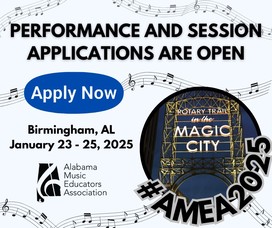 The Alabama Music Educators Association is thrilled to announce the call for applications for performances and educational sessions for our upcoming 2025 Conference. Set to inspire and engage music educators across the state, the conference will take place from January 23-25, 2025, at the Birmingham-Jefferson Convention Complex (BJCC) in Birmingham, Alabama.
The Alabama Music Educators Association is thrilled to announce the call for applications for performances and educational sessions for our upcoming 2025 Conference. Set to inspire and engage music educators across the state, the conference will take place from January 23-25, 2025, at the Birmingham-Jefferson Convention Complex (BJCC) in Birmingham, Alabama.
Performance Applications: We are looking for dynamic and diverse performances that will captivate and inspire our attendees. If you represent a band, orchestra, choir, or any other music ensemble and wish to showcase your talent, we invite you to apply. For more information and to submit your application, click here.
Session Submissions: In addition to performances, we are seeking proposals for educational sessions. Whether you specialize in instrumental, choral, general music education, or music technology, we welcome your expertise. Share your knowledge and insights with fellow music educators by submitting your session proposal here.
This is a unique opportunity to contribute to a vibrant community of music educators and to make an impact at one of the most anticipated music education events in Alabama. The deadline for both performance and session applications is Saturday, June. Don’t miss this chance to be a part of the 2025 AMEA Conference!.
For more information and to submit your performance application and/or session proposal, click on one of the buttons below. We look forward to your submissions and to seeing you in Birmingham!
From the Editor…
 The Ala Breve serves as a platform for sharing knowledge, celebrating achievements, and fostering a sense of community among music educators across our great state. I am reaching out to each of you, our valued members, with an invitation to contribute your insights, experiences, and talents to the pages of Ala Breve. Whether you have a fascinating case study to share, a unique teaching method to discuss, or an inspiring anecdote from your journey in music education, your contributions are invaluable to our collective growth and enrichment. As a passionate member of AMEA, there are several ways you can actively participate and enrich our publication:
The Ala Breve serves as a platform for sharing knowledge, celebrating achievements, and fostering a sense of community among music educators across our great state. I am reaching out to each of you, our valued members, with an invitation to contribute your insights, experiences, and talents to the pages of Ala Breve. Whether you have a fascinating case study to share, a unique teaching method to discuss, or an inspiring anecdote from your journey in music education, your contributions are invaluable to our collective growth and enrichment. As a passionate member of AMEA, there are several ways you can actively participate and enrich our publication:
- Share your expertise, experiences, and insights related to music education, teaching strategies, performance, or any other relevant topic.
- Write articles, interviews, or profiles that inspire fellow educators.
- Celebrate achievements, milestones, and innovative projects within your school or community.
- Share case studies of successful music programs, impactful projects, or unique challenges faced and overcome.
- Members engaged in academic research related to music education can submit their findings for publication, contributing to the scholarly discourse among readers.
- Share lesson plans, teaching materials, and creative ideas.
- Review music-related books, resources, or software.
- Submit photographs or artwork for the cover or within the magazine.
- Create and submit multimedia content, such as audio or video recordings for publication in our digital issues (Please adhere to copyright guidelines).
- Share our articles and features on social media platforms.
Remember, Ala Breve thrives on the collective passion and dedication of our members. Your voice matters, and your contributions will resonate with educators across Alabama. Please feel free to reach out to me directly with any ideas, submissions, or questions you may have.
- Review the contributor guidelines.
- Submit an article on our website.
- Email me directly.
Thank you!
Garry Taylor, Editor
Alabama Music Educators Association
1600 Manor Drive NE
Cullman, AL 35055
(256) 636-2754
Updates to NASM Accreditation Standards and Guidelines for Higher Ed Music Programs
 In lieu of a post-conference HED recap, I figure no time like the present to review recent changes in philosophy and language being discussed and implemented in higher education at the national level. At the recent annual meeting for the National Association of Schools of Music held last November, several notable changes in language affecting higher education music programs that are accredited by NASM or that are seeking accreditation by NASM were discussed, voted on, and ratified by the NASM membership, Board of Directors, and Commission. Over the holidays, these updates were added to the NASM Handbook that all institutional members adhere to and use to guide curriculum development at their respective institutions. The new 2023-2024 Handbook that includes these recent updates is now available for viewing online at https://nasm.arts-accredit.org
In lieu of a post-conference HED recap, I figure no time like the present to review recent changes in philosophy and language being discussed and implemented in higher education at the national level. At the recent annual meeting for the National Association of Schools of Music held last November, several notable changes in language affecting higher education music programs that are accredited by NASM or that are seeking accreditation by NASM were discussed, voted on, and ratified by the NASM membership, Board of Directors, and Commission. Over the holidays, these updates were added to the NASM Handbook that all institutional members adhere to and use to guide curriculum development at their respective institutions. The new 2023-2024 Handbook that includes these recent updates is now available for viewing online at https://nasm.arts-accredit.org
My biggest takeaway from the recent updates to the NASM Handbook is that language choice in the world of music education is very impactful. The language choices used in accreditation materials must be representative of an extremely broad array of music programs existing at higher ed institutions across the nation; institutions that differ greatly in size, scope, and mission, so it is important that national standards are equitable, and representative of all constituents served by the Association. One thing that I was looking forward to at the AMEA conference this year was seeing how an increased emphasis on diversity, equity, and inclusion, and a diverse representation of presenters, ensembles, presentation topics, and panel discussions, would involve and include more members from across the state of Alabama. The sense of community, camaraderie, and fellowship shared by members of the Association during conference week is so important to spurring on further discussion and to forming an identity that encompasses all of our shared goals as music educators, rather than our differences.
One of the most important Handbook language revisions approved by the NASM Commission focuses on historical content and repertory selections for students enrolled in professional Baccalaureate degrees in music and for students enrolled in any undergraduate music program leading to teacher certification. In other words, standards that guide which composers, genres, and cultural perspectives to include and/or exclude when designing curriculum.
The changes made to section VIII.B.4. are a good example of the new language changes adopted by the Commission. We can see the impact of those wording changes by comparing the 2022-2023 Handbook to the 2023-2024 Handbook. For our purposes, the changes appear in yellow highlight.
VIII.B.4. (2022-2023 Handbook)
History and Repertory: Students must acquire basic knowledge of music history and repertories through the present time, including study and experience of musical language and achievement in addition to that of the primary culture encompassing the area of specialization.
VIII.B.4. (2022-2023 Handbook)
History and Culture: As appropriate to their major field of study, students must acquire basic overview knowledge of music history and various music cultures through the present time, including study and experience of musical language and achievements that extend beyond those associated with the primary specialization.
So, why are these changes in wording significant? In my opinion, these updates acknowledge that there is no one-size-fits-all course of study in music and that music students benefit greatly from being exposed to a variety of composers, genres, and repertoire. Changes in wording effectively create space for and encourage greater diversity, rather than only focusing exclusively on Western European canon composers, genres, and repertoire.
Another important Handbook revision, made to sections XIV.B.3.c., XIV.B.6.c., and XIV.B.7.d., focuses on content choices for students enrolled in Master’s degree programs in Conducting, Performance (general), and Opera Performance. These revisions include modifications to the language proficiencies required in these programs.
XIV.B.3.c. (2022-2023 Handbook)
Choral conducting majors must be proficient in vocal pedagogy and English, German, French, Italian, and Latin diction. They must have general phonetic knowledge and skills that can be related to other languages. They should have language competencies sufficient to understand texts in the repertory.
XIV.B.3.c. (2023-2024 Handbook)
Choral conducting majors must be proficient in vocal pedagogy and in the diction of various languages (e.g., English, German, French, Italian, Latin, and other world languages as appropriate). They must have general phonetic knowledge and skills that can be related to the various languages. They should have language competencies sufficient to understand texts in the repertory.
XIV.B.6.c. (2022-2023 Handbook)
Voice majors are expected to be proficient in English, German, French, and Italian diction and to have general phonetic knowledge and skills that can be applied to various other languages. They should have language competencies sufficient to understand texts in the repertory.
XIV.B.6.c. (2023-2024 Handbook)
Voice majors are expected to be proficient in the diction of various languages (e.g., English, German, French, Italian, Latin, and other world languages as appropriate) and to have general phonetic knowledge and skills that can be applied to the various languages. They should have language competencies sufficient to understand texts in the repertory.
XIV.B.7.d. (2022-2023 Handbook)
Students must develop advanced competence in English, Italian, French, and German diction and general phonetic knowledge and skills that can be applied to other languages. They should have language competencies sufficient to understand texts in the repertory.
XIV.B.7.d. (2023-2024 Handbook)
Students must develop advanced competence in the diction of various languages (e.g., English, German, French, Italian, Latin, and other world languages as appropriate), and general phonetic knowledge and skills that can be applied to the various languages. They should have language competencies sufficient to understand texts in the repertory.
The same type of modifications to language proficiencies can also be seen in the revisions made to Appendix I.D., Standards and Guidelines for the Education and Training of Conductors: Choral, Orchestral, Wind, and to Appendix I.D., Standards and Guidelines for the Education and Training of Conductors: Choral, Orchestral, Wind, pertaining to the Master’s degree in Conducting.
Appendix I.D.1.C.2. (2022-2023 Handbook)
For choral and orchestral conductors, language and diction skills sufficient to coach singers in French, German, Italian, English, and Latin, as well as general phonetic knowledge that can be related to other languages are essential. For orchestral conductors, skills sufficient to conduct rehearsals in modern European languages are desirable.
Appendix I.D.1.C.2. (2023-2024 Handbook)
For choral and orchestral conductors, language and diction skills, and general phonetic knowledge sufficient to coach singers in various languages including as appropriate, but not limited to, French, German, Italian, English, Latin, and other world languages, are essential. For orchestral conductors, skills sufficient to conduct rehearsals in various world languages are desirable.
Appendix I.D.4.E.1.c. (2022-2023 Handbook)
Choral conducting majors must be proficient in vocal pedagogy and English, German, French, Italian, and Latin diction. They must have general phonetic knowledge and skills that can be related to other languages. They should have language competencies sufficient to understand texts in the repertory.
Appendix I.D.4.E.1.c. (2023-2024 Handbook)
Choral conducting majors must be proficient in vocal pedagogy and in the diction of various languages (e.g., English, German, French, Italian, Latin, and other world languages as appropriate). They must have general phonetic knowledge and skills that can be related to the various languages. They should have language competencies sufficient to understand texts in the repertory.
So, why are these changes in wording significant? These changes help open doors to welcome students from a diverse array of backgrounds and cultures. The beauty of these changes is that the revised standards do not detract from the importance of the languages that vocalists have been expected to be proficient in, instead, they merely create space for the study and practice of additional languages outside of the big four, or big five if you will.
In conclusion, I look forward to seeing how additional changes in philosophy and language at the national level continue to open doors for more students from diverse backgrounds, and I wish all of my HED colleagues from across the state much success during the spring semester. See you at next year’s conference!urs.
Collegiate Transition and Chapter Highlights
Presidential Farewell
 Dear Alabama cNAfME Members,
Dear Alabama cNAfME Members,
My time as the Alabama cNAfME President has come to a close in a much different fashion than I imagined it. I am sad that I did not get to say a formal goodbye at the conference, so I would like to take a moment to do so. Serving as the ALcNAfME President was one of the greatest honors of my lifetime. I learned more than I ever imagined I would, did more than I thought I could and even traveled further than I thought I might. My time on the state board will define my career as a music educator. I have learned the importance of advocacy, the inner workings of our wonderful state organization, what it means to be a true leader, and so much more. I cannot even begin to express my gratitude for this experience. Thank you to the rest of the AMEA Governing Board for teaching me and letting me be a voice in our organization. Thank you to cNAfME for allowing me to learn how to lead. Thank you to Dr. Merciers for guiding me and for building me up. Thank you to my fellow executive board members for helping me make my crazy dreams come true. I am proud to say I served on the ALcNAfME board and cannot wait to see what the future holds for me. Once again, thank all of you so very much!
-Sarah Hicks
Virtual Winter Summit
Even though AMEA was canceled this year, we have another opportunity to meet. The Alabama cNAfME State Executive Board will host a virtual summit on Zoom on February 17, 2024, at 2 p.m. Distinguished and experienced educators Will Panter and Dr. Mary Land will present “The Mentorship Continuum: Continuing Growth in Students & Self,” and Dr. Sarah Burns and Blair Callaway will share their expertise in “Professional Collaboration between Cooperating Teachers and Student Interns.” This will be an excellent opportunity for extra time with a few of our clinicians selected from the AMEA Conference.
We will also be having our General Business Meeting and holding elections for the Alabama cNAfME State Executive Board. It is time to choose a new President-Elect, Secretary, and Treasurer. This is a great way to serve and experience a leadership role at the state level. If you are interested in running, please attend the Summit. Stay tuned for the Zoom invite on Instagram @cnafme_al.
University of Alabama Service Project
In spring 2023, the University of Alabama cNAfME Executive Board became aware of a need at University Place Elementary School. In most Tuscaloosa City Schools, music teachers use Quaver Ed, a technology-based curriculum, to guide instruction. University Place Elementary School’s music teacher teaches Quaver’s ukulele unit instead of recorder. Due to underfunding, only about half of the class can hold an instrument during instructional time. The other students use cardboard with hot-glued toothpicks affixed to them instead of actual instruments.
When the UA cNAfME chapter learned of this inequity, they made it their annual goal to raise the funds to buy University Place a complete classroom set of instruments. The chapter planned and hosted a formal dance for the School of Music to accomplish this goal. Executive Board members secured several community sponsors who provided food, decorations, and lighting for the event. Students in every area of the music building, including choir, orchestra, marching band, music therapy, music education, and music performance, bought tickets to attend the event and support the cause. On September 29, 2023, over 100 students filled the band hall to celebrate and support University Place Elementary School.
The UA chapter raised over $2,000 to support Tuscaloosa-area elementary school music programs. Due to the event’s success, they not only purchased ukuleles for University Place Elementary School but also plan to support Walker Elementary, which desperately needs classroom instruments, too. The ALcNAfME State Executive Board is proud of the University of Alabama chapter and the contributions made to their community. They are a great example of collegiate chapters’ work all over the state.
Sensational Elementary Music EducationThrough the Winter Doldrums
 The beginning of the school year is such an exciting time for me. August rolls around, and as comfortable as I am with my relaxed summer schedule, I get pumped about starting a new school year. I thrive with new students, schedules, and programs. I get enthused about planning new lessons and activities for my students. I usually hit the ground running with each grade level, making music, singing songs, and playing instruments. We are mastering all those music standards.
The beginning of the school year is such an exciting time for me. August rolls around, and as comfortable as I am with my relaxed summer schedule, I get pumped about starting a new school year. I thrive with new students, schedules, and programs. I get enthused about planning new lessons and activities for my students. I usually hit the ground running with each grade level, making music, singing songs, and playing instruments. We are mastering all those music standards.
By Thanksgiving, reality sets in, and I start to recognize the challenges I will face for the remainder of the school year. Come December, I am just surviving until winter break. My New Year’s resolutions might get me focused on my students again, but I quickly begin to feel the winter doldrums setting in. Our counselors and health care professionals often remind us that this temporary feeling of lethargy and melancholy is the result of shorter days disrupting our circadian rhythms. Either way, I struggle to keep things engaging for all students in my classroom as I feel the school year slow to a snail’s pace.
This year was particularly gloomy with the cancellation of our annual conference. Every year, I look forward to the conference. I enjoy seeing old colleagues, meeting new friends, and hearing all the amazing concerts. I don’t know about you, but I need this time every year. I find it essential to my professional growth and to my ability to “make it” through the rest of the school year. I need fresh, new ideas and lesson plans. I need new songs and inspiration to get my brain back in creative mode.
How are we going to “make it” this year without our conference? Rest assured, your elementary/general board members are hard at work developing some upcoming professional development opportunities for us all. Stay tuned for more information, and start planning now for next year’s conference. In the meantime, I asked a few of our elementary division board members to share some of their favorite music lessons based on children’s literature. I hope we can inspire you with a little something to bring your classroom out of the winter doldrums.
One of my favorite children’s books is Mortimer by Robert Munsch. It is the story of a young boy who resists the attempts of his parents, siblings, and even the police to put him to bed by singing a song. I use the book to teach first grade-students high and low on Orff instruments. In the book, as each person (or group of people) goes upstairs or downstairs to scold Mortimer, we hear Thump, Thump, Thump, Thump, and students play going upstairs or downstairs or their instruments. Students also enjoy banging a drum when someone shuts the door, and they love repeating “Mortimer, be quiet,” in different voices. We sing Mortimer’s song together throughout the book. I composed a tune for Mortimer’s song on mi, sol, la. You could compose your tune using any pitches or rhythms you need to teach your students. This book is fun for all grade levels and can be used to teach many different music standards.
From Melissa McIntyre, Vestavia Hills Elementary Liberty Park:
AVA Updates
 Happy second semester! I hope you are off to a great start and are making beautiful music with your students. I know we all have been reminded in the last few weeks of the importance of remaining flexible and patient not just with our students, but with ourselves and the many obstacles that are put in our way. Thank you for remaining positive when we encounter these barriers and for teaching your students to do the same.
Happy second semester! I hope you are off to a great start and are making beautiful music with your students. I know we all have been reminded in the last few weeks of the importance of remaining flexible and patient not just with our students, but with ourselves and the many obstacles that are put in our way. Thank you for remaining positive when we encounter these barriers and for teaching your students to do the same.
AMEA Conference
I am deeply disappointed that we were not able to see each other at the AMEA conference this year. Please know that the decision to cancel was not made lightly, and that we were all very upset to have to make such a tough decision. There were many consequences to the cancellation, including not being able to hear the beautiful performances from the Hartselle High School Chamber Chorale, Hewitt-Trussville High School Chamber Choir, Indian Springs School Chamber Choir, Jacksonville State University A Cappella Choir, and the University of North Alabama Collegiate Singers and Chamber Choir. I know the performances would have been fantastic and I want to personally thank the students and directors for their hard work and preparation for these performances. I also want to extend a special thank you to the AVA board who put in a tremendous amount of work to prepare for this conference. Your attention to detail and work ethic was greatly appreciated and a huge help to me.
Thankfully, we have rescheduled our Gospel Honor Choir for March 22 at First Baptist Huntsville. We will rehearse during the day and combine our concert with the All-State Elementary Choir that evening. We are thankful for the work of our directors and clinicians who were able to make this rescheduled event happen.
General Membership Updates
Thank you to everyone who helped our All-State auditions run so smoothly. I was extremely pleased with the number of students we had to register and audition. I am confident that we are returning to our pre-covid numbers with our auditionees. Your students were well-prepared and they should be proud to be a part of truly the best choral students in our state. We are still looking to streamline the audition process. If you are a member of our All-State teacher panel, please be looking for a survey about our audition process and new options for auditions.
Our All-State Show Choir auditions also went very smoothly this year. We had an increased number of auditionees for this event, and the judges were impressed with the quality of auditions. Thank you to Cameron Johnson for continuing to facilitate our All-State Show Choir. The All-State Show Choir Festival will be held at Hartselle High School on April 24-26.
All-State Choral Festival
I am looking forward to seeing you all at the All-State Choral Festival on February 29-March 2 at the Birmingham Jefferson Convention Complex. I am excited for our conductors Eric Barnum, Julie Yu-Oppenheim, Jeffrey Benson, Alex Gartner, and D’Walla Simmons-Burke. This year, we are thrilled to have as our guests at convocation, the Miles College Choir under the direction of Mrs. Valerie Harris and the University fo Alabama Singers under the direction of Dr. Morgan Luttig.
A few reminders for our upcoming festival:
- All students who were selected for All-State must pay the registration fee, even if they choose not to participate in the festival.
- Please encourage students to review their music prior to the festival.
- The state high school basketball championships will be happening at the Legacy Arena during this time, so please be aware that parking will be even more difficult than usual.
Reminders
Deadlines for State Choral Performance Assessment and Solo and Ensemble are quickly approaching. Please be sure to register early in order to secure your preferred performance time. Please remember to check deadlines prior to registering so that no late fees are incurred.
I hope that your semester is going smoothly and is filled with beautiful music-making with your students. I look foward to seeing you at All-State. As always, if you have any questions, suggestions, or concerns, please contact me at hilen.wilson.ava@gmail.com.
Thank you, Hilen Wilson
AOA Updates
 I am so proud to inform you that the 2024 North and South Region Orchestra and All-State Orchestra Festivals were an enormous success. The North and South Region Festivals were held in Huntsville and Greenville, respectively, January 6-7, and the All-State Orchestra Festival was held on the campus of the University of Alabama, February 8-11. Our conductors for the North Region Festival were William Waag (Santa Fe Youth Orchestra) and Andrea Dawson (Middle TN State University), and our conductors for the South Region Festival were Dan Allcott (TN Tech University) and Susan Mullen (Murfreesboro Symphony and the Webb School).
I am so proud to inform you that the 2024 North and South Region Orchestra and All-State Orchestra Festivals were an enormous success. The North and South Region Festivals were held in Huntsville and Greenville, respectively, January 6-7, and the All-State Orchestra Festival was held on the campus of the University of Alabama, February 8-11. Our conductors for the North Region Festival were William Waag (Santa Fe Youth Orchestra) and Andrea Dawson (Middle TN State University), and our conductors for the South Region Festival were Dan Allcott (TN Tech University) and Susan Mullen (Murfreesboro Symphony and the Webb School).
At the 2024 AOA All-State Orchestra Festival, the Festival Orchestra was led by Mr. Robin Fountain. Originally from the United Kingdom, Mr. Fountain joined us from the Outer Banks of North Carolina. Mr. Fountain is the Emeritus Professor of Orchestral Studies and Conducting at Vanderbilt University’s Blair School of Music. He has also served as the Music Director of the Southwest Michigan Symphony and the Williamsport Symphony in Pennsylvania. Mr. Fountain was also my primary conducting teacher and remains a close friend and mentor today. It was incredibly special for me to witness my students, and students from across Alabama, studying with, and learning from, my mentor.
The Sinfonia was led by Dr. César Leal. Originally from Bogotá, Colombia, Dr. Leal joined us from Gettysburg, Pennsylvania, where he is the Director of Orchestral Activities at the Sunderman Conservatory at Gettysburg College. There, Dr. Leal also serves as a professor of musicology.
The Consort String Orchestra was led by Mrs. Jennifer Drake. Mrs. Drake joined us from Boise, Idaho, where she serves as the Music Director of the Serenata Orchestra and the Boise Philharmonic Youth Orchestras. She is also the founder of the Idaho Viola Camp and the Co-Artistic Director of the Idaho Orchestra Institute.
Both of the Regional Orchestra Festivals and the All-State Orchestra Festival hosted nearly 200 young musicians from all corners of Alabama. These students are the cream of the crop, not only among young musicians in our state, but among young people in our state. They are among Alabama’s finest young musicians, scholars, seekers, dreamers, and future leaders. Undoubtedly, they will shape their present and future communities with their work ethic and their dedication to their artform.
I am grateful to have the opportunity to announce to you that orchestral music education is vibrant and so alive in many areas of Alabama, but I must also tell you that, at this moment, approximately one-third of Alabama schools do not have a music teacher. We have much work left to do, my friends. It is the sincere hope of the Alabama Orchestra Association and Alabama Music Educators Association that, someday, every public-school student in Alabama will have access to this art form if they desire to participate. You can help us by spreading the word about the work we are doing to your community, colleagues, friends, family, and government officials. Let your legislators know that you, too, dream of a day where all Alabama children will have the opportunity to have their lives enriched through the arts. While we celebrate the incredible work of the students that were able to participate, I would be remiss if I did not also acknowledge the children that were not present due to lack of resources and opportunity.
Members of the AOA and beyond, thank you for all that you do to ensure that orchestral music thrives in the State of Alabama. May we strive to build musical communities where our students find safe spaces to express themselves, their experiences, their hopes, and their dreams for a kinder world where all are loved, nurtured, and supported. May this be our mission and may music be our vehicle.
Musically yours, Joseph Lee, President
ABA Updates
 I am writing this article, the morning after the decision was made to cancel our AMEA Professional Development Conference. I was looking forward to celebrating the performances of our great ensembles, and the wonderful clinics that were going to inspire our members to reach for the stars and teach with the passion and purpose that brought them to this wonderful profession. I was looking forward to spending time visiting the exhibits and talking with old friends and meeting new colleagues. I was excited…we all were excited, but Mother Nature had other plans and we were tasked with making a difficult decision. I am thankful to be part of a leadership team that takes their responsibilities to heart, that had foresight years ago to plan for rainy days, for leaders that are not afraid to make the difficult decisions, knowing the impact it would have on many people in our community. While the excitement of the 2024 conference has been taken away, there is a renewed excitement of knowing the organization is in great hands with outstanding leadership, as we move into the upcoming weeks, months, and years.
I am writing this article, the morning after the decision was made to cancel our AMEA Professional Development Conference. I was looking forward to celebrating the performances of our great ensembles, and the wonderful clinics that were going to inspire our members to reach for the stars and teach with the passion and purpose that brought them to this wonderful profession. I was looking forward to spending time visiting the exhibits and talking with old friends and meeting new colleagues. I was excited…we all were excited, but Mother Nature had other plans and we were tasked with making a difficult decision. I am thankful to be part of a leadership team that takes their responsibilities to heart, that had foresight years ago to plan for rainy days, for leaders that are not afraid to make the difficult decisions, knowing the impact it would have on many people in our community. While the excitement of the 2024 conference has been taken away, there is a renewed excitement of knowing the organization is in great hands with outstanding leadership, as we move into the upcoming weeks, months, and years.
One of the jobs that I was tasked with last night was to contact the band directors of each of the scheduled performing ensembles and break the news that the conference had been canceled and they would not be able to perform this year. It was a difficult conversation that I had with each of them, as I completely understand the amount of energy, time, emotion, and financial investment it takes to perform at the state conference. It is something a director thinks about every day, from the moment they receive the letter telling them they have been accepted until they step foot onto that stage and stand before their peers. So I encourage you all to reach out to Graham Bennett, John Cain, Matthew Chambliss, Justin Compton, Latrice Green, Meredyth Petersen, Jacob Souder, and Casey Thomas and express how much we appreciate what they and their students did to prepare for this event. I am sure this would mean a great deal to each of them, knowing you took the time to show your support of their efforts. After all, if we don’t lift each other up, then who will?
Speaking of lifting others up, join me in congratulating these outstanding band programs that recently participated or have been selected to perform in several national events. The Alabama A&M University “Maroon and White Marching Band” was given the prestigious honor of leading the 2023 Macy’s Thanksgiving Day Parade this past November. The Hoover High School “First Edition” Jazz Band made its 3rd appearance at The Midwest Clinic in December 2023. The Albertville High School “Aggie Marching Band” along with the University of Alabama “Million Dollar Marching Band”, performed in the Tournament of Roses Parade in Pasadena, CA, in January 2024. The Troy University Symphony Band, the Huntsville High School Wind Ensemble, and the Auburn Junior High School Wind Ensemble have been selected to perform at the 2024 CBDNA/NBA Southern Division Conference to be held February 29 – March 2, 2024, at the University of Memphis.
In looking forward, I am excited about several of our upcoming ABA events. This year we move to our new concert band Music Performance Assessment format, by using the new cumulative music list based on levels. Please make sure you are using that list to choose your list piece. Also, take a moment to look at the Sight-reading guidelines, the adjudication rubric, and other general information that is available on our website.
Another new event for ABA is our Jazz Music Performance Assessment. The Jazz MPA Registration is now open in the Members Area of alaband.org. Thompson High School has agreed to be our host site this year, and the event will take place on Thursday, April 18. All information pertaining to the classification of bands, expectations, and the rubric are also posted on the website under the Jazz Division tab.
I am extremely excited about the 2024 All-State Band and Solo Festival. I encourage your students to participate in the Solo Festival. It is such a wonderful opportunity for musical growth! We are fortunate to have five incredible conductors for our All-State Bands this year. Dr. Paula Crider was scheduled to conduct the Red Band, but a recent PET scan revealed that her cancer has returned and she is having to cancel all of her spring engagements. Please join me in sending prayers for complete healing for this precious lady. Mr. Richard Floyd will step in as our Red Band Conductor and Dr. Sue Samuels will replace him as our White Band Conductor. Carol Brittan Chambers will conduct the Blue Band, Cheryl Floyd will conduct the Middle School Red Band, and Mickey Smith, Jr will be the Middle School White Band Conductor. We have several clinics scheduled and great exhibits to keep everyone engaged in all things Band!
I cannot close this article without mentioning the passing of Robert W. Smith. Much has been written about the impact he had on the entire world of music education. Oh, how I cherish the fact that one of his last clinics was with us this past summer. I was fortunate to be asked to share my thoughts with the Instrumentalist magazine this fall, where I shared some of my memories and due to space restraints the last paragraph that I wrote was edited out, but I think this is the perfect way to close this article. “In many ways, Robert’s life was a reflection of the lyrics to the song “The Greatest Love of All “. He believed “the children are our future. Teach them well, and let them lead the way”. As teachers, we are responsible for the future…We teach the future…..and we need to carry forth and honor the legacy and remembrance of not just Robert W. Smith but all of those teachers whose lives impacted ours.
Badges, Ready and Waiting
 Imagine preparing over 1000 badges for the 2024 AMEA Professional Development Conference only to face the force of Mother Nature. As the Registrar for AMEA, it is my job to make sure all attendees are registered, paid, and have the appropriate membership. We were through with the pre-registered, FAME, All-State Jazz Band members and Vendor’s badges by 4 pm. on Tuesday, January 16th. The snow and ice were not cooperative, but we were ready to head to Huntsville just in case. Even though it was disappointing to have to box the materials and store them away, I was proud of the decision the AMEA board made in consideration for the safety of our conference attendees and performers. At this time, I have sent refunds to those schools that paid by check, and we are working to assure anyone who used PayPal will be issued a credit back to the card they used. I thank those who donated their fees and encourage those who can do so to consider donating to support the financial well-being of AMEA. I look forward to next year, and I hope that you do, too! PS
Imagine preparing over 1000 badges for the 2024 AMEA Professional Development Conference only to face the force of Mother Nature. As the Registrar for AMEA, it is my job to make sure all attendees are registered, paid, and have the appropriate membership. We were through with the pre-registered, FAME, All-State Jazz Band members and Vendor’s badges by 4 pm. on Tuesday, January 16th. The snow and ice were not cooperative, but we were ready to head to Huntsville just in case. Even though it was disappointing to have to box the materials and store them away, I was proud of the decision the AMEA board made in consideration for the safety of our conference attendees and performers. At this time, I have sent refunds to those schools that paid by check, and we are working to assure anyone who used PayPal will be issued a credit back to the card they used. I thank those who donated their fees and encourage those who can do so to consider donating to support the financial well-being of AMEA. I look forward to next year, and I hope that you do, too! PS
You Are AMEA!
 If I’m completely honest, I’ve had a difficult time thinking of what this article should cover. In normal years, this article would cover the great successes of our conference. We would all glow about the fantastic performances, the thought-provoking sessions, and the time shared with like-minded colleagues. However, this year is different. We are not left with fond memories, but merely our wonderings of what could’ve been.
If I’m completely honest, I’ve had a difficult time thinking of what this article should cover. In normal years, this article would cover the great successes of our conference. We would all glow about the fantastic performances, the thought-provoking sessions, and the time shared with like-minded colleagues. However, this year is different. We are not left with fond memories, but merely our wonderings of what could’ve been.
Many of you know that I enjoy spending my limited free time in library archives researching the past. Learning about the past always gives me great comfort and clarity. I visited the Auburn University Archives the Sunday after we decided to cancel the conference to examine the Ala Breve from the early years of our Association. While there wasn’t a full set of every volume of the Ala Breve, I did gain an appreciation and perspective from our past.
The very first issue of Ala. breve (original spelling) was published in November 1955. The president of AMEA was Lamar Triplett. I will be honest; I was taken aback when I saw the first president’s column in the Ala. breve. You see, I have heard many stories about Mr. Triplett because Mr. Triplett was my Dad’s junior high school band director. Actually, Mr. Triplett is one of the people who encouraged my Dad to become a music educator. It was also Mr. Triplett who encouraged AMEA to host a conference. “To knit our organization closer, reach all phases of music education, a meeting of all music educator personnel, elementary through college level, with clinics for all levels, performing groups at all levels, and panels for discussion of all our mutual problems, would greatly increase our understanding of each other, and give administrators a better understanding of our values in the teaching of music and most of all the relationship of music to the overall educational curriculum in the state” (Triplett, 1956, p. 1).
During the early years of AMEA, the conference was held in conjunction with All-State. In fact, All-State was held for all the divisions during the same three days in March at the University of Alabama. All-State was the cornerstone of the AMEA conference. During the conference, there were meetings and clinics for all divisions and a Friday evening banquet with a dinner and dancing. Don’t worry – I’m not suggesting we bring back the Friday night dancing!
I continued thumbing through the old issues of Ala. breve. I smiled at the many pictures and columns from music education legends in AMEA’s history. I loved seeing pictures of Dr. Ed Cleino and Dr. Lacey Powell in their early years; they were both so kind to me as an early career music teacher. I laughed at the many impassioned pleas from the membership chairperson for people to join AMEA and MENC. It was fascinating to learn about the early stages and implementation of hosting the first conference. It’s important to note that AMEA existed for almost 8-10 years before a conference was hosted.
Sadly, the archives do not have a complete set of the Ala Breve. I also checked other university’s holdings – no university has a complete set of the Ala Breve. If you have issues of the Ala Breve from the 1960s-1990s, we would love to scan them and place them on AMEA’s new website that will launch this summer.
My journey into our Association’s past ended with the April 1960 issue. Of course, we can view the last 19 years of Ala Breve on the AMEA website. However, I would have loved to see more from the 60s-90s. I had more questions to be answered. I wanted to know when Ala. breve became Ala Breve. How did the Association handle canceling the conference in the early 90s? I would have loved to see the growth of our conference over the decades.
Although we often refer to AMEA as the three-day conference we attend in January, AMEA is more than just a conference. For me, AMEA is a collection of hard-working music educators, devoted music education supporters and advocates, and students eager to make music. AMEA is an organization made up of people. I agree with an editorial published in the second issue of the Ala. breve, “Clearly the only objective of A.M.E.A. is to advance the cause of music education through a cooperative organization of musicians and music educators…Come on in. We can rise to such lofty heights and make such beautiful music…TOGETHER”. (Ala breve, 1956, p. 5). For me, AMEA has always been about the people. I’m often asked why people should join AMEA and NAfME and my response has always stayed the same – the people. My life has been enriched because of the people I have met as a musician and music educator.
It would be disingenuous for me not to use this President’s Column to recognize the fabulous work our people have been doing. Even though we didn’t have a conference, so much work went into planning the conference. The AMEA staff – Dr. Rusty Logan, Garry Taylor, Pat Stegall, and David Raney completed countless hours of work before the decision was made to cancel the conference. In addition, they all have done countless hours of work after the decision was made to cancel the conference. In addition, Joey Harbison has been invaluable with our industry members and helping Rusty with the exhibitors. AMEA would not be as strong of an Association without our hardworking staff! Thank you, Rusty, Garry, Pat, and David for your dedication to AMEA.
I hope you will all take a moment to thank your division presidents. They spent hours planning a fantastic conference for all of you. They had to witness countless dreams and plans dissipate with one board motion and vote. Many of them have also had to deal with the herculean task of rescheduling All-States, honor groups, and performing ensembles to ensure the students still receive the benefit of AMEA performances. Thank you, Lori, Joe, Hilen, Alicia, Meghan, Carly, and Sarah for serving your divisions and AMEA with integrity.
In addition, Heather Holmes served all of us with grace and a calming presence. Thank you, Heather, for your gentle spirit, perspective, and kindness during this time.
I have been blessed to be friends with our President-elect for over 25 years. Phil has provided me with perspective, guidance, and friendship that is immeasurable. Thank you, Phil, for being the calm and reassuring voice throughout this experience. I am blessed by your friendship, and I know AMEA will be blessed by your leadership.
I want to thank all of you for your patience and understanding as we had to make difficult decisions and deal with the ramifications of our decisions. I’m thankful for the many calls, texts, and messages of support for the AMEA Board. Thank you to our clinicians who prepared fantastic sessions for all of us. Most of all, thank you to our directors and students who were set to perform at the conference. I know what a disappointment canceling the conference was for all of you, however, I have been so encouraged by your individual communities’ support. It has brought me great joy to see “AMEA Conference” concerts happening throughout our state. As I said earlier, AMEA is more than a conference – you brought AMEA to the people of Alabama. Thank you for ensuring that the music of the AMEA conference still happened.
Earlier, I said my Ala Breve archive hunt ended in 1960, but that’s not entirely true. While the archives did end in 1960, they picked back up in March of 2001. As I thumbed through the March 2001 issue of Ala Breve I saw a familiar face – mine. There on page 10, was a fresh-faced student teacher that had their final article as the cMENC state president. As I sat and stared at my picture in the Ala Breve, I couldn’t help but be humbled and grateful that I am part of this incredible organization. Although I may have some age on me and a lot of music-teaching battle scars, my words from 2001 still ring true in 2024.
“I am very appreciative and feel fortunate to have served you as President this year. You all have allowed me to spread my wings and see the music education world from a different perspective. I look forward to joining what I feel is the most noble profession, teaching. On top of that, teaching music. Through music, we have the opportunity to teach children how to create something intimate and self-rewarding. We must always look for ways to move on and ever upward towards excellence. Never settle for just sliding by, and never give up!” (Lyda, 2001, p. 10).
We must remember that AMEA is more than a conference. AMEA is an organization of impassioned people. We are people who work each day to provide and ensure the children of Alabama have access to music education. TOGETHER we can change the lives of students through the power of music. I’m eternally grateful for you and your work in our state. Thank you, friends, for allowing me to be part of AMEA’s journey in the past, the present, and into the future.
Test Donation Page
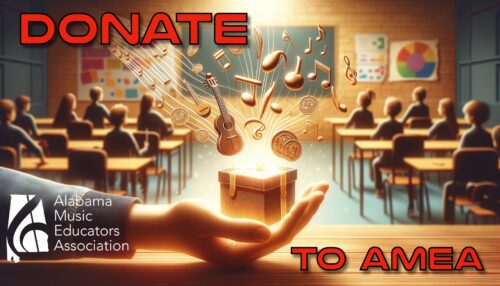
In light of our annual conference cancellation, the Alabama Music Educators Association needs your support more than ever. Your donation will help us continue our mission to enrich music education across the state and help offset the cost associated with canceling the conference.
Your generosity plays a vital role in shaping the future of music education in Alabama.

